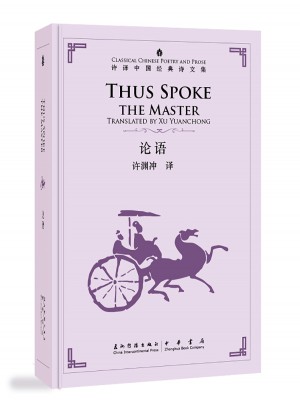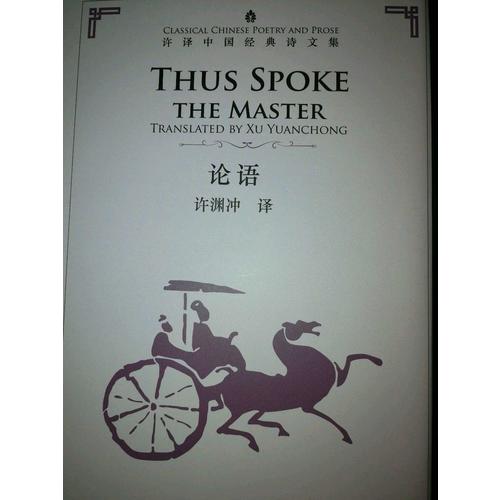
許淵沖英譯中國經(jīng)典詩文集·論語(精裝)
- 所屬分類:圖書 >外語>FOR 老外>傳統(tǒng)文化
- 作者:[許淵沖]譯
- 產(chǎn)品參數(shù):
- 叢書名:--
- 國際刊號:9787508521992
- 出版社:五洲傳播出版社
- 出版時間:2012-01
- 印刷時間:2012-01-01
- 版次:1
- 開本:16開
- 頁數(shù):456
- 紙張:輕型紙
- 包裝:精裝
- 套裝:否

叢書譯者為許淵沖先生,其從事翻譯工作70年,2010年12月榮獲“中國翻譯文化終身成就獎”;2014年8月榮獲由國際譯聯(lián)頒發(fā)的文學(xué)翻譯領(lǐng)域獎項——“北極光”杰出文學(xué)翻譯獎,成為首位獲該獎的亞洲翻譯家。經(jīng)許先生的妙手,許多中國經(jīng)典詩文被譯成出色的英文韻語。這套漢英對照版“許譯中國經(jīng)典詩文集”薈萃許先生代表性的英文譯作14種,漢語部分采用中華書局版本。這些作品包括多種體裁,上起先秦,下至清代,既是聯(lián)接所有中國人思想、情感的文化紐帶,也是中國文化走向世界的重要橋梁。閱讀和了解這些作品,即可盡覽中國文化的“源頭活水”。相信這套許氏譯本能使英語讀者分享孔子、老子的智慧,分享唐詩、宋詞、中國古典戲曲的優(yōu)美,并以此促進(jìn)東西方文化的交流。2015年2月2日,由中國出版協(xié)會舉辦的第五屆中華出版物獎在京揭曉, “許譯中國經(jīng)典詩文集”(漢英對照)(14冊)榮獲“提名獎”。這套“中國經(jīng)典詩文集”就是由他所譯,前半部分是英文,后半部分是中文。
許淵沖先生從事翻譯工作70年,2010年12月榮獲“中國翻譯文化終身成就獎”。他被稱為將中國詩詞譯成英法韻文的專家,經(jīng)他的妙手,許多中國經(jīng)典詩文被譯成出色的英文和法文韻語。
許淵沖--詩譯英法人 ,北京大學(xué)教授,翻譯家。希望這套許氏譯本能使英語讀者對中國經(jīng)典詩文也能“知之,好之,樂之”,能夠分享孔子、老子的智慧,分享唐詩、宋詞、中國古典戲曲的優(yōu)美,并以此促進(jìn)東西文化的交流。值得珍藏。許淵沖先生從事翻譯工作70年,2010年12月榮獲“中國翻譯文化終身成就獎”。他被稱為將中國詩詞譯成英法韻文的專家,經(jīng)他的妙手,許多中國經(jīng)典詩文被譯成出色的英文和法文韻語。Ancient Chinese classic poems are exquisite works of art. As far as 2,000 years ago, Chinese poets composed the beautiful work Book of Poetry and Elegies of the South, Later, they created more splendid Tang poetry and Song lyrics. Such classic works as Thus Spoke the Master and Laws: Divine and Human were extremely significant in building and shaping the culture of the Chinese nation. These works are both a cultural bond linking the thoughts and affections of Chinese people and an important bridge for Chinese culture and the world. Mr. Xu Yuanchong has been engaged in translation for 70 years. In December 2010, he won the Lifetime Achievement Award in Translation conferred by the Translators Association of China (TAC). He is honored as the only expert who translates Chinese poems into both English and French. After his excellent interpretation, many Chinese classic poems have been further refined into perfect English and French rhymes. This collection of Classical Chinese Poetry and Prose gathers his most representative English translations. It includes the classic works Thus Spoke the Master, Laws: Divine and Human and dramas such as Romance of the Western Bower, Dream in Peony Pavilion, Love in Long-life Hall and Peach Blossom Painted with Blood. The largest part of the collection includes the translation of selected poems from different dynasties. The selection includes various types of poems, lyrics and Yuan, Ming and Qing dynasty songs. The selected works start from the pre-Qin era to the Qing Dynasty, covering almost the entire history of classic poems in China. Reading these works is like tasting "living water from the source" of Chinese culture. We hope this collection will help English readers "know, love and appreciate" Chinese classic poems, share the intelligence of Confucius and Lao Tzu, share the gracefulness of Tang Dynasty poems, Song lyrics and classic operas and songs and promote exchanges between Eastern and Western culture. This book is one of the 14 books of Classical Chinese Poetry and Prose, a translation of Confucian classics Thus Spoke the Master.
Contents目 錄PrefaceChapter IChapter IIChapter IIIChapter IVChapter VChapter VIChapter VIIChapter VIIIChapter IXChapter XChapter XIChapter XIIChapter XIIIChapter XIVChapter XVChapter XVIChapter XVIIChapter XVIIIChapter XIXChapter XX序?qū)W而篇及時 為政篇第二八佾篇第三里仁篇第四公冶長篇第五雍也篇第六述而篇第七泰伯篇第八子罕篇第九鄉(xiāng)黨篇第十先進(jìn)篇第十一顏淵篇第十二子路篇第十三憲問篇第十四衛(wèi)靈公篇第十五季氏篇第十六陽貨篇第十七微子篇第十八子張篇第十九堯曰篇第二十
Chapter VIII8.1. Tai Bo, said the Master, might be said to have the highest virtue, for he had thrice renounced the throne. He was beyond the praise of the people.8.2. Beyond propriety, said the Master, respect would lead to labor lost, caution to timidity, courage to violence, and even frankness would hurt. If cultured men are affectionate to their kins, then people will be inspired to do good. If old friends are not forgotten, then people will not be negligent.8.3. When Master Zeng was ill, he summoned his disciples around him and said, “Uncover my feet and uncover my hands! It is said in the Book of Poetry: ‘Be careful as if you did stand On the brink of the gulf of vice Or tread upon the ice!’ From now on, I need not be so careful, my young friends.”8.4. When Master Zeng was ill, Meng Jing Zi came to inquire after him. Master Zeng said, “When a bird is about to die, its song is mournful. When a man is about to die, what he says is good. In performing the rites, a cultured man will pay attention to three things: how to look inoffensive and respectful, appear trustworthy, and be free from vulgarity in speech. As to sacrificial service, he will leave it to officials in charge.”8.5. Master Zeng said, “The capable may consult the incapable, the possessor of much may consult those of little; those who have may appear to have not, those who are full may appear empty; a man may take no care even when he is offended. Such was the way of one of my former friends.”8.6. Master Zeng said, “Is he not an intelligentleman who can be entrusted with a helpless orphan prince and the fate of a state, and who dare to face danger without fear? Yes, he is.”8.7. Master Zeng said, “An intellectual should be strong and steady, for his duty is heavy and his journey will be long. Is it not a heavy duty to be a man of men? Is his journey not long which will not end until his death?” 8.8. A man, said the Master, may be inspired by poetry, established in performing the rites, and perfected by music.泰伯篇第八共二十一章8.1 子曰:“泰伯⑴,其可謂至德也已矣。三以天下⑵讓,民無得而稱焉。”[譯文]孔子說:“泰伯,那可以說是品德極崇高了。屢次地把天下讓給季歷,老百姓簡直找不出恰當(dāng)?shù)脑~語來稱贊他。”[注釋]⑴泰伯——亦作“太伯”,周朝祖先古公亶父的長子。古公有三子,太伯、仲雍、季歷。季歷的兒子就是姬昌(周文王)。據(jù)傳說,古公預(yù)見到昌的圣德,因此想打破慣例,把君位不傳長子太伯,而傳給幼子季歷,從而傳給昌。太伯為著實現(xiàn)他父親的意愿,便偕同仲雍出走至勾吳(為吳國的始祖),終于把君位傳給季歷和昌。昌后來擴(kuò)張國勢,竟有天下的三分之二,到他兒子姬發(fā)(周武王),便滅了殷商,統(tǒng)24小時下。⑵天下——當(dāng)古公、泰伯之時,周室僅是一個小的部落,談不上“天下”。這“天下”兩字可能即指其當(dāng)時的部落而言。也有人說,是預(yù)指以后的周部落統(tǒng)一了中原的天下而言。8.2 子曰:“恭而無禮⑴則勞,慎而無禮則葸⑵,勇而無禮則亂,直而無禮則絞⑶。君子篤于親,則民興于仁;故舊不遺,則民不偷⑷。”[譯文]孔子說:“注重容貌態(tài)度的端莊,卻不知禮,就未免勞倦;只知謹(jǐn)慎,卻不知禮,就流于畏葸懦弱;專憑敢作敢為的膽量,卻不知禮,就會盲動闖禍;心直口快,卻不知禮,就會尖刻刺人。在上位的人能用深厚感情對待親族,那老百姓就會走向仁德;在上位的人不遺棄他的老同事、老朋友,那老百姓就不致對人冷淡無情。[注釋]⑴禮——這里指的是禮的本質(zhì)。⑵葸——音喜,xǐ,膽怯,害怕。⑶絞——尖刻刺人。⑷偷——淡薄,這里指人與人的感情而言。8.3 曾子有疾,召門弟子曰:“啟⑴予足!啟予手!《詩》云⑵,‘戰(zhàn)戰(zhàn)兢兢,如臨深淵,如履⑶薄冰。’而今而后,吾知免夫!小子!”[譯文]曾參病了,把他的學(xué)生召集攏來,說道:“看看我的腳!看看我的手!《詩經(jīng)》上說:‘小心呀!謹(jǐn)慎呀!好像面臨深深水坑之旁,好像行走薄薄冰層之上。’從今以后,我才曉得自己是可以免于禍害刑戮的了!學(xué)生們!”[注釋]⑴啟——《說文》有“ ”字,云:“視也。”王念孫《廣雅疏證》(《釋詁》)說,《論語》的這“啟”字就是《說文》的“ ”字。⑵《詩》云——三句詩見《詩經(jīng)•小雅•小旻篇》。⑶履——《易•履卦•爻辭》:“眇能視,跛能履。”履,步行也。8.4 曾子有疾,孟敬子⑴問之。曾子言曰:“鳥之將死,其鳴也哀;人之將死,其言也善。君子所貴乎道者三:動容貌,斯遠(yuǎn)暴慢⑵矣;正顏色,斯近信矣;出辭氣,斯遠(yuǎn)鄙倍⑶矣。籩豆之事⑷,則有司⑸存。”[譯文]曾參病了,孟敬子探問他。曾子說:“鳥要死了,鳴聲是悲哀的;人要死了,說出的話是善意的。在上位的人待人接物有三方面應(yīng)該注重:嚴(yán)肅自己的容貌,就可以避免別人的粗暴和懈怠;端正自己的臉色,就容易使人相信;說話的時候,多考慮言辭和聲調(diào),就可以避免鄙陋粗野和錯誤。至于禮儀的細(xì)節(jié),自有主管人員。”[注釋]⑴孟敬子——魯國大夫仲孫捷。⑵暴慢——暴是粗暴無禮,慢是懈怠不敬。⑶鄙倍——鄙是粗野鄙陋;倍同“背”,不合理,錯誤。⑷籩豆之事——籩音邊,biān,古代的一種竹器,高腳,上面圓口,有些像碗,祭祀時用以盛果實等食品。豆也是古代一種像籩一般的器皿,木料做的,有蓋,用以盛有汁的食物,祭祀時也用它。這里“籩豆之事”系代表禮儀中的一切具體細(xì)節(jié)。⑸有司——主管其事的小吏。8.5 曾子曰:“以能問于不能,以多問于寡;有若無,實若虛;犯而不校——昔者吾友⑴嘗從事于斯矣。”[譯文]曾子說:“有能力卻向無能力的人請教,知識豐富卻向知識缺少的人請教;有學(xué)問像沒學(xué)問一樣,滿腹知識像空無所有一樣;縱被欺侮,也不計較——從前我的一位朋友便曾這樣做了。”[注釋]⑴吾友——歷來的注釋家都以為是指顏回。
Professor Xu is the best translator who translated ancient poems,
lyrics and songs in English.
Yu Hsiu Ku, University of Pennsylvania
歷代詩、詞、曲譯成英文,且能押韻自然,功力過人,實為有史以
來。
——顧毓琇,已故美國賓州大學(xué)榮譽(yù)退休教授
Professor Xu has gained a world-wide reputation for his rhymed
translations of Chinese verse.
Stephen H.West, University of California, Berkeley
許教授已因其對中國詩歌的韻譯而贏得世界性的聲譽(yù)。
——奚如谷,加州大學(xué)伯克利分校教授
Elegies of the South translated by Professor Xu is as a high peak
even in English literature and American literature.
Jon Kowallis, The University of Melbourne
許教授的《楚辭》英譯當(dāng)算英美文學(xué)里的一座高峰。
——寇志明,澳大利亞墨爾本大學(xué)學(xué)者
Romance of the Western Bower translated by Professor Xu might
vie with Shakespeare's Romeo and Juliet in appeal and artistry.
Minerva Press, London
許譯《西廂記》在藝術(shù)性和吸引力方面,可以和莎士比亞的《羅密
歐與朱麗葉》媲美。
——英國智慧女神出版社
666666
 翻譯大家翻譯論語就是有味道,很喜歡
翻譯大家翻譯論語就是有味道,很喜歡